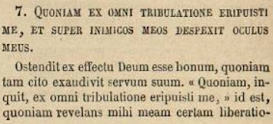Verse 5
Turn back the evils upon my enemies; and cut them off in thy truth.
Averte mala inimicis meis; et in veritate tua disperde illos.
[1] For the Son of man shall come in the glory of his Father with his angels: and then will he render to every man according to his works. Filius enim hominis venturus est in gloria Patris sui cum angelis suis : et tunc reddet unicuique secundum opera ejus. [Matt. xvi. 27]
Verse 6
I will freely sacrifice to thee, and will give praise, O God, to thy name: because it is good:
Voluntarie sacrificabo tibi, et confitebor nomini tuo, Domine, quoniam bonum est.
[1] And Jesus said to him, Why callest thou me good? None is good but one, that is God. Jesus autem dixit ei : Quid me dicis bonum? nemo bonus, nisi unus Deus. [Marc. x. 18]; And Jesus said to him: Why dost thou call me good? None is good but God alone. Dixit autem ei Jesus : Quid me dicis bonum? nemo bonus nisi solus Deus. [Luc. Xviii. 19]
Verse 7
For thou hast delivered me out of all trouble: and my eye hath looked down upon my enemies.
Quoniam ex omni tribulatione eripuisti me, et super inimicos meos despexit oculus meus.
enemies,” that is, in that same foreshowing my eye hath already seen my enemies prostrate and vanquished: he refers here to what he had said before, “and cut them off in thy truth.” Unless it is preferable to interpret this, as we indicated above, so that the Prophet’s very act of praying began his deliverance, that is to say, Saul withdrawing at hearing of the reported arrival of the Philistines; then the sense would be: Since Thou hast delivered me out of all the present trouble, and my eye hath seen my enemies withdrawing with Saul their general. For the word despexit / looked down does not connote contempt but simply something seen, which is clear from the Hebrew word raathah; for it could be translated: my eye hath looked upon my enemies, that is, my eye did freely and without fear look upon my enemies. The Vulgate translator put despexit / looked down, to signify that David from a high location saw his enemies prostrate or withdrawing, as in the two explanations given. Now true it is that David looked down, that is, he looked from above at his enemies, whether because he was physically on the aforesaid mountain, or because the spirit of prophecy raised him to that height, and from the height(s) of divine revelation he saw his enemies lying down below him. Indeed, this Psalm is recited daily at the hour of Prime so that we may learn from David’s example to be strengthened against persecutors with the weapons of prayer at the beginning of the day, knowing that “all that will live godly in Christ Jesus, shall suffer persecution(s patiently)”.[1]
[1] And all that will live godly in Christ Jesus, shall suffer persecution. Et omnes, qui pie volunt vivere in Christo Jesu, persecutionem patientur. [II Tim. iii. 12]




No comments:
Post a Comment